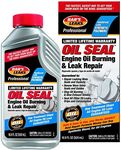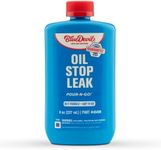We Use CookiesWe use cookies to enhance the security, performance,
functionality and for analytical and promotional activities. By continuing to browse this site you
are agreeing to our privacy policy
Best Oil Leak Additives
From leading brands and best sellers available on the web.#2

Lucas Oil
12%OFF
Lucas Oil 10278 Engine Oil Stop Leak - 1 Quart
View Product
#3

Lucas Oil
Lucas Oil 10279 Engine Oil Stop Leak - 1 Gallon
View Product
#4

STP
STP High Mileage Oil Treatment + Stop Leak Engine Oil Additive, 15 fl oz, Contains ZDDP Anti-Wear Agent to Fight Friction, Rejuvenates Seals and Gaskets, Stops Leaks
View Product
#5

Bar's Leaks
Bar's Leaks OS-1 Seal (Engine Oil Burning/Leak Repair), 16.9 Fluidounces
View Product
#6

BlueDevil Products
Blue Devil (49499) Engine Oil Stop Leak - 8 Ounce
View Product
#7

Bar's Leaks
Bar's Leaks 1010 Grey Engine Oil Stop Leak - 11 oz.
View Product
#8

Lucas Oil
5%OFF
Engine Oil Stop Leak Top Off Additive/6x1/Quart
View Product
#9

XADO
XADO ATOMEX Stop Leak Engine Oil Additive Sealer (Bottle, 250 ml) - Repair Gaskets & Seals Treatment
View Product
#10

Bar's Leaks
Bar's Leaks 1000 Engine Repair - 16 oz.
View Product
Buying Guide for the Best Oil Leak Additives
Choosing the right oil leak additive can help you address minor oil leaks in your vehicle without the need for immediate mechanical repairs. These additives are designed to condition seals and gaskets, potentially stopping or slowing leaks. However, not all additives are the same, and picking the right one depends on your vehicle's needs and the severity of the leak. Understanding the key specifications will help you make an informed decision and ensure the product is compatible with your engine and effective for your situation.Compatibility with Oil TypeThis specification tells you whether the additive can be used with conventional, synthetic, or high-mileage oils. It's important because using an incompatible additive can reduce its effectiveness or even harm your engine. Additives are usually labeled for use with specific oil types. If your car uses synthetic oil, make sure the additive is safe for synthetics. For older vehicles with high-mileage oil, look for additives that mention compatibility with high-mileage formulas. Always check your vehicle’s manual and the additive’s label to ensure a good match.
Seal Conditioner ContentSeal conditioners are the main active ingredients in oil leak additives. They work by rejuvenating rubber seals and gaskets, making them more flexible and helping to stop leaks. The amount and type of seal conditioner can vary. Some additives have a higher concentration for more severe leaks, while others are milder for preventive use. If you have a small, slow leak, a mild conditioner may be enough. For more noticeable leaks, a stronger formula might be necessary. Consider the severity of your leak when choosing the right level of seal conditioner.
Engine CompatibilityNot all oil leak additives are suitable for every engine type. Some are formulated specifically for gasoline engines, while others can be used in diesel engines or even motorcycles. Using the wrong additive can lead to poor results or engine issues. Always check the product label to see which engine types it supports. If you drive a diesel vehicle or a motorcycle, make sure the additive is explicitly marked as safe for those engines.
Additive Concentration and DosageThis refers to how much additive you need to use per oil change or per quart/liter of oil. Some products are highly concentrated and require only a small amount, while others need to be added in larger quantities. The right dosage ensures the additive works effectively without over-treating your oil. Check your vehicle’s oil capacity and follow the instructions on the additive’s packaging. If you have a larger engine, you may need more additive, so choose a product that matches your engine size and oil volume.
Potential Side EffectsSome oil leak additives can thicken your oil or leave residues, which might affect engine performance or clog filters over time. It’s important to choose an additive that is known for being gentle on engine components and does not cause unwanted build-up. Look for products that mention being safe for long-term use and that do not alter oil viscosity significantly. If you are concerned about long-term effects, read user reviews or consult a mechanic before choosing an additive.




